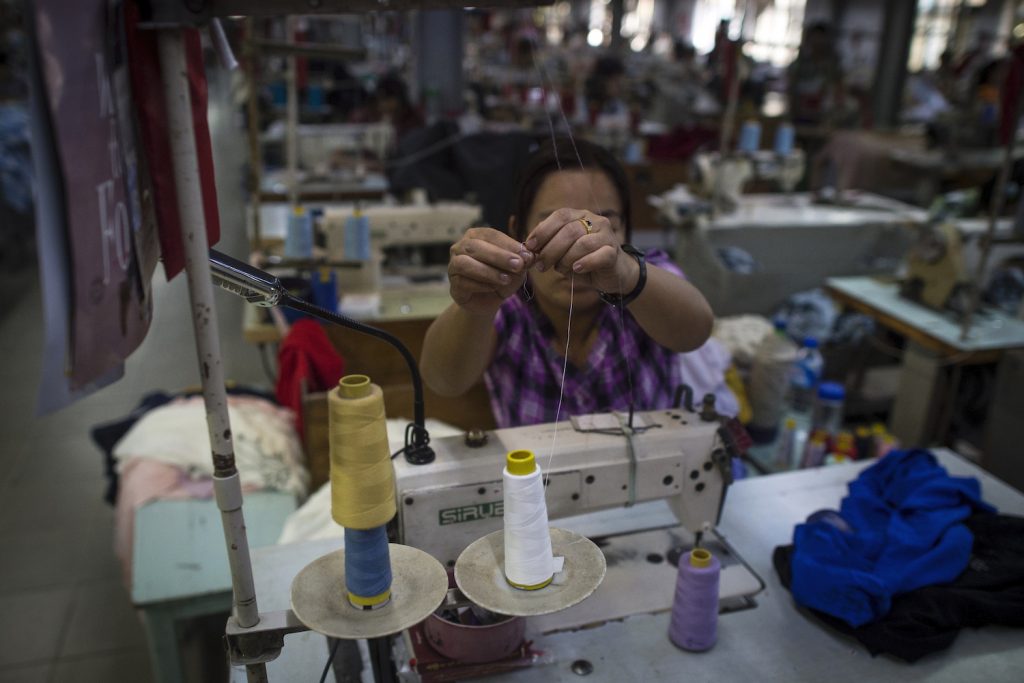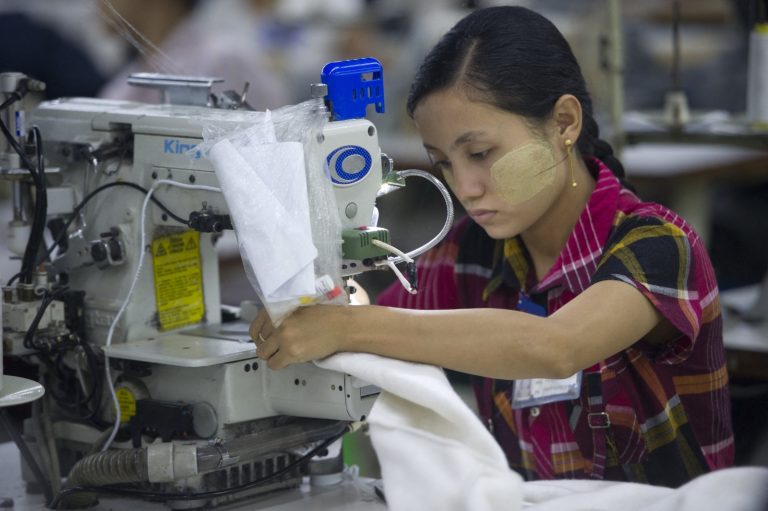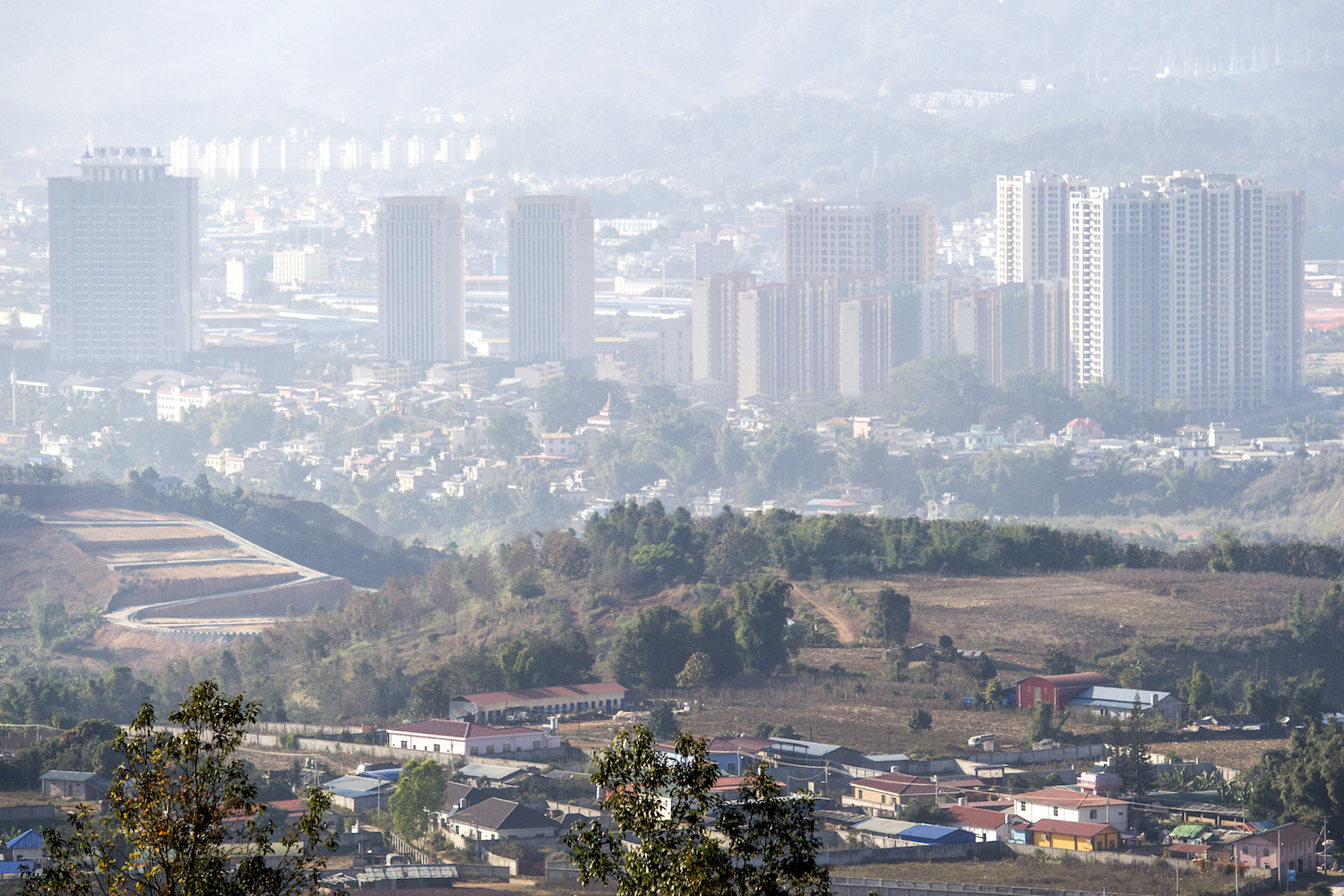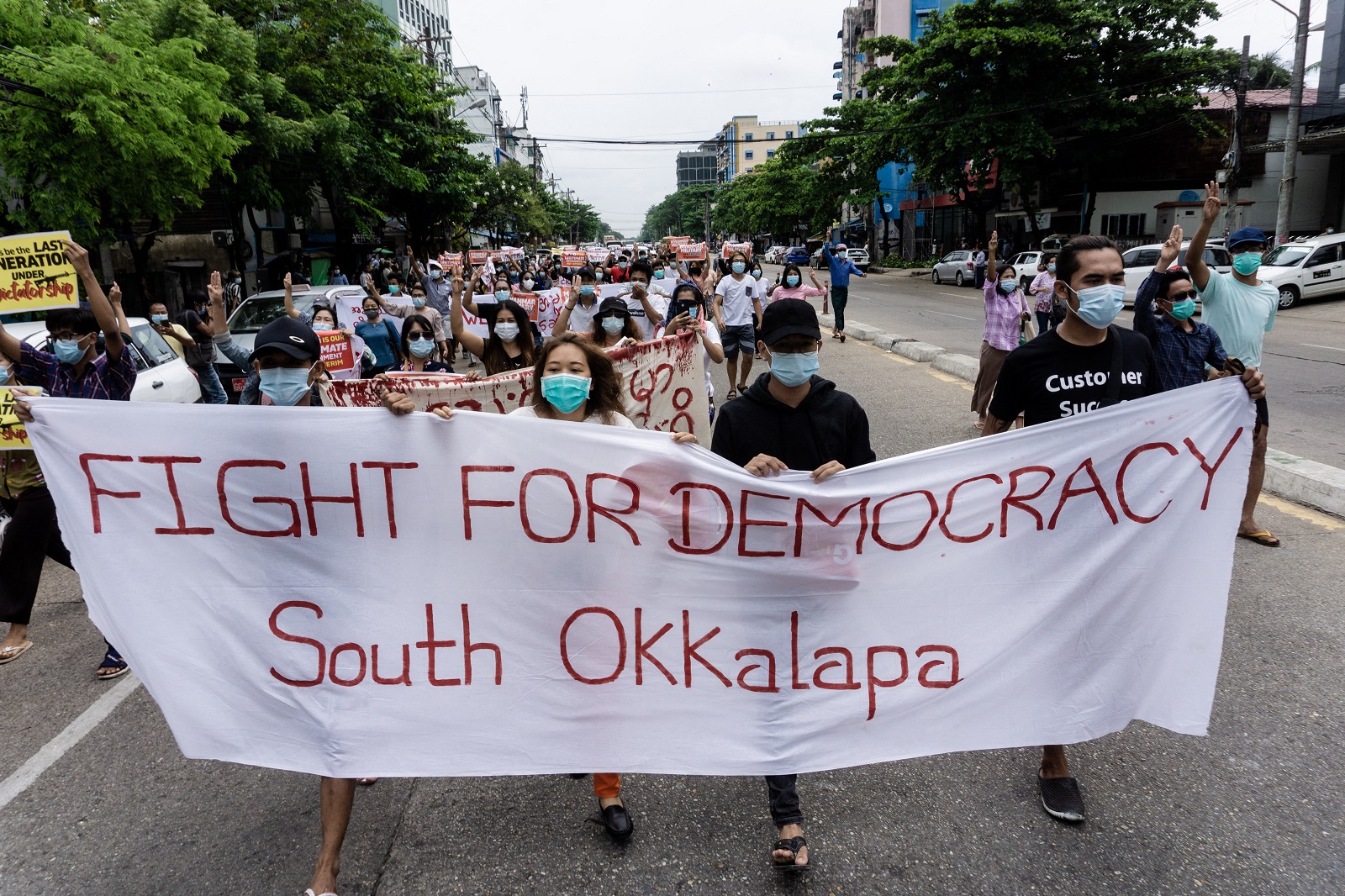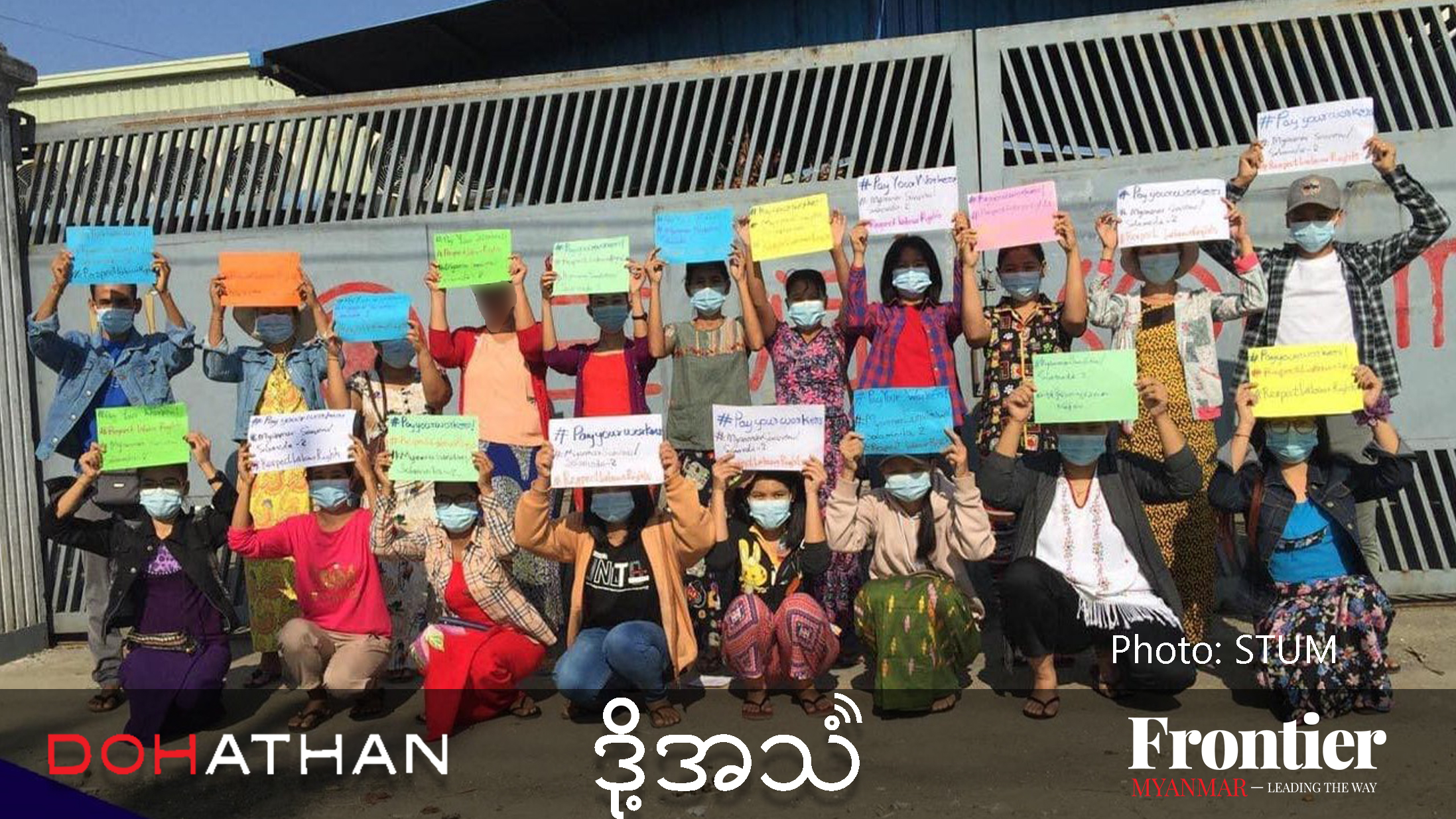Workers have been bearing the brunt of measures imposed to counter the pandemic and their plight has been compounded by poor governance and hostility towards organised labour.
By YE YINT KHANT MAUNG | FRONTIER
In a video conference call on May 8 that discussed COVID-19 precautions in factories and other workplaces, State Counsellor Daw Aung San Suu Kyi spoke of the importance of educating workers about the threat posed by the virus. “If the workers are careless, they will suffer,” she said.
While education is important, it is far from enough to protect factory workers from the effects of the virus, however. The government and business community may try to put the blame and burden of prevention on factory workers, but their plight during the coronavirus pandemic is a predictable result of negligence and careless governance and corporate conduct.
Protecting factory workers from COVID-19 requires government intervention to ensure that working conditions are safe and workers have the protective equipment they need. It requires oversight to ensure that factory workers receive full salaries and living wages for doing their jobs. An effective financial and social security system is critical to ensure that workers who are dismissed are not forsaken and it requires responsible business conduct that is not opportunistic or exploitative. More than ever Myanmar’s factory workers need strong independent unions to ensure that they can protect themselves, their interests and one another during this crisis.
However, during the COVID-19 pandemic Myanmar’s factory workers have seen their demands for a minimum wage increase silenced, their wages cut or unpaid, their concerns about unsafe factory conditions dismissed, their financial and social security insufficient or entirely absent, and their unions oppressed.
Factory workers in Myanmar have long faced difficulties resulting from poor governance and economic policies that use low labour costs to encourage investment. COVID-19 has simply compounded these problems and hardships.
Workers have also not benefited from government measures to ease the impact of COVID-19. In early April, the Central Committee on Prevention, Control and Treatment of the Coronavirus Disease issued a statement indicating that people with irregular income would be provided with basic foodstuffs during the Thingyan holiday. The distribution began on April 10. Yet, factory workers, including those who were dismissed, were not included in the definition of people with irregular income.Dismissed workers and those whose incomes were reduced were left to fend for themselves.
The Social Security Fund established in 2012 was meant to act as a safety net for workers in times of crisis. Although the government could not have envisioned a global pandemic when it designed the fund, it is a reality that the only relief mechanism available to factory workers is woefully insufficient and dysfunctional. The government announced that contributing workers would receive 40 percent of their salary from the fund if factories closed. Workers who are not registered do not receive benefits. Although factories are generally considered part of the formal economy, a significant proportion of workers are still not registered. Others will miss out even though they have been making contributions.
“In some labour offices, officials did not give workers social security board numbers because they claimed to be too busy. In some factories, owners collected money from workers but did not provide them with social security numbers. Employers just took the contribution. Some owners manipulated the number of workers in their factory to reduce their responsibility. As a result, many workers will not receive the social security that they have paid for,” said Ko Naing Htay Lwin, a labour rights activist.
The government is only partly to blame for the suffering caused by pay cuts or dismissals.
Factory workers have seen their wages cut despite no change in work demands. Others were victims of factory owners who fled without paying salaries for work already completed.
Workers at the General Enterprises Garment, Loadstar, and Euro Gate factories in Yangon Region’s South Dagon Township, and those at the Amber Stone, Myanmode, Xiang Yi and Myanmar Uniview factories at Hlaing Tharyar Township, had to go on strike to receive their salary for March and full compensation entitlements after their jobs were suddenly terminated.
The Myanmar Industries Craft and Services Trade Union Federation and Federation of Garment Workers-Myanmar helped these workers, highlighting the critical supporting role of union networks during a crisis. Some factories, such as Global Wealth, closed after paying workers full compensation, with ordinary workers receiving between K400,000 and K600,000 in total. This is unlikely to be enough to sustain them in the months ahead, when they will find it difficult to get another job due to the economic effects of COVID-19.
At the World Jin, Royal Apollo and Su Xin factories, workers are yet to receive their salaries. Workers from Royal Apollo and Su Xin factories are yet to receive their pay for February. The South Korean owner of the World Jin garment factory fled without paying salaries for April, despite workers being asked to resume work on May 4.
A worker at the World Jin factory said employees were already in a dispute with the owner before she fled and had warned the Labour Relations Department that she might leave the country. “After she ran away without paying our salary, [the authorities] told us they will sue the employer. That’s all. We don’t know when or if we will receive our salary,” he said.
In such situations, it is factory workers who are left to shoulder the burden of irresponsible business conduct and government negligence.
During the last week of February, some factories closed because of shortages of raw materials imported from China. They included shoe, bag and garment factories.
On March 8, labour rights groups formed a committee to examine the closures, because most shuttered factories were involved in disputes with workers. The closures affected sixteen factories in Yangon and one in Pathein, and officials said between 10,000 and 15,000 workers had been left jobless. The question is whether there will be equal opportunity and treatment of workers when the factories re-open. A worker from Global Wealth 1, a bag supplier that closed on March 3 due to raw materials problems, said, “I heard the factory will re-open in July but I’m sure that as a unionist they won’t appoint me again. Me and seventeen other workers protested to increase our wages.”
The suppression of union movements in factories is nothing new. Long before the COVID-19 crisis, employers were using a range of tactics to disband trade unions established at factories. The tactics include sacking union members, shutting factories and promptly re-opening with new employees, and setting up parallel unions – that is, a rival union organised by the employer that is favourable to the employer’s interests and seeks to undermine existing unions.
COVID-19 became an excuse to continue union busting and wage cuts without adequate justification. Unionists who tried to stand up to abusive or exploitive employers during the pandemic soon became targets for retaliation and were arrested, charged and imprisoned.
After the first positive COVID-19 cases in Myanmar were reported on March 23, Myanmar Industrial Craft and Services Trade Union Federation and Confederation of Trade Unions Myanmar recommended that factories be closed and audited as part of national level tripartite discussions involving government officials, and employer and worker representatives. The Federation of Garment Workers Myanmar, which is still in the process of registering, also started a campaign for a one-month factory closure.
These suggestions were dismissed by the government and uncertainty about factory closures continued until the end of the Thingyan holiday. On April 19 at 8pm the Ministry of Labour, Immigration and Population issued a confusing statement ordering that factories and other workplaces be closed until April 30 pending inspections by special teams to check for compliance with COVID-19 guidelines. The closures were later extended to May 15.
As of May 5, 3,000 factories had been inspected and 2,500 that met social distancing criteria were permitted to re-open. However, the situation at one garment factory in Yangon’s Shwepyithar Township epitomised the risks to workers. The factory re-opened on May 14, a day before it was inspected, apparently in violation of the rules.
One worker, Ma Hnin Wai Lwin, recalled the scene: “Soon after they [the authorities] arrived, line supervisors were told to separate workers to be one machine away from each other. Some workers were sent out of the workstation or were out to lunch. I don’t know whether our factory passed or not. We are just working as usual. But there is not enough soap for workers to wash their hands. The work place is very hot and has terrible ventilation.”
Factory workers have little choice but to tolerate unsafe workplace conditions. Fear of being dismissed means that many remain silent despite not being properly paid. Dismissed and underpaid workers also face the prospect of being evicted from their accommodation.
Hnin Wal Lwin said workers were paid K94,000 for April. “Obviously, it is not enough,” she said. “Our dormitory fee, including electricity, is between K55,000 and K75,000. Most of my friends struggle to pay dormitory fees. Our landlord is generous and he only took half of it, but starting from this month I need to pay in full,” she added.
Former World Jin employee Ma Zin Mar Oo said she and other unpaid colleagues were having to move out of their accommodation because they can’t pay the rent. “The authorities said they would ask the owner to let us stay, but no one ever came,” Zin Mar Oo said.
Underlying many of the hardships facing factory workers during the pandemic is the issue of the minimum wage, which has been unchanged at K4,800 for a day’s work since May 2018. Under the terms of the 2015 Minimum Wage Law, a mandatory increase was due in May this year.
In January, more than 5,000 workers from the Federation of Garment Workers-Myanmar protested at Hlaing Tharyar in support of a minimum daily wage of K 9,800. The increase is vital because factory workers are unable to keep up with rising living costs. However,the COVID-19 crisis has diverted attention away from the issue, and labor activists now face additional threats if they try raise it.
As the government and business community promote hand-washing and competitions for home-made face masks, factory workers are scrambling to protect themselves and each other. They are fighting for their lives, as well as for their rights. Their struggle is not only against COVID-19, but also against the conduct of the government and the business sector that has made an already difficult situation exponentially worse.


